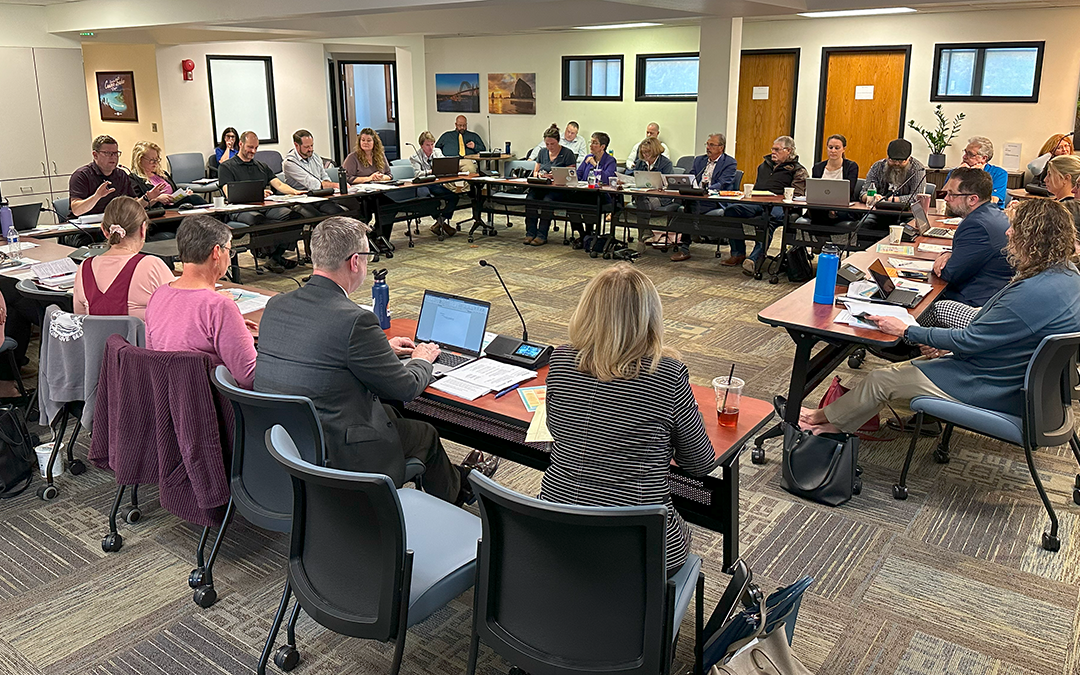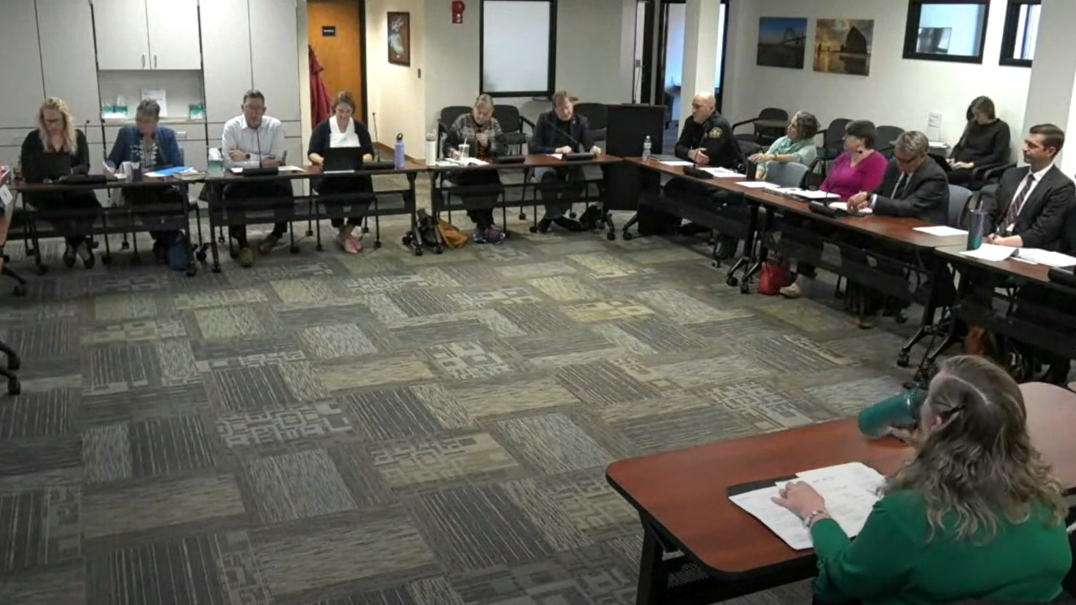
Mar 29, 2024 | AOC Advocacy, AOC News, Health & Human Services
This year’s short legislative session was remarkably successful, as the Association of Oregon Counties (AOC)’s health and human services priorities largely aligned with those of legislators on both sides of the aisle. The following policy and funding bills, effective upon the governor’s signature, will better equip counties to address the state’s dual homelessness and substance abuse crises.
HB 4092 addresses AOC’s top health and human services policy priority, and requires a mandatory cost study to be conducted every five years for services that our community mental health programs are statutorily mandated to provide. The study is aimed to capture the true cost of the service delivery array, correcting for inflation-based increases as well as unfunded mandates. The first study is due in December 2024 and because of the short timeframe, will be limited to court-mandated services. A full study will be conducted in 2025.
HB 4092 also mandates and funds a workgroup to recommend measures to reduce the administrative burden on community mental health programs and their local contracted providers. The report is due at the end of the year. A survey of local providers estimates that 40% to 60% of every clinician’s day is spent on administrative work rather than direct care. Any reduction in this burden will immediately increase Oregon’s public behavioral health services capacity.
HB 4002 (Measure 110 reform policy bill) establishes local jail-based and mobile medication for opioid use disorder programs through grants from the Criminal Justice Commission. The bill requires at least 10% of total grant awards to be awarded to facilities in rural areas.
HB 5204 (omnibus funding bill for Measure 110 reform and related programs) provides:
- Gap funding for specialty courts, aid and assist community restoration services, and jail diversion
- Start-up funding for county deflection (pre-arrest diversion) programs
- Start-up funding for the medication for opioid use disorder program
- Behavioral health workforce development funding at Oregon universities to attract and support students acquiring degrees and certifications
HB 4001 establishes an interim task force that will recommend specialty court system improvements and sustainability measures for consideration in the 2025 session. There are two seats on the task force for county government.
Contributed by: Legislative Affairs Manager Jessica Pratt

Mar 27, 2024 | AOC Advocacy, AOC News, Health & Human Services, Public Safety & Veterans
The short, fast-paced 2024 legislative session ended with real wins for the Association of Oregon Counties (AOC) public safety portfolio. AOC’s Public Safety Steering Committee identified two priorities in advance of the session — increasing state investment in community corrections for the remainder of the 23-25 biennium, and elevating the county voice and role in Ballot Measure 110 reform conversations. Both of these priorities were achieved due to the ongoing advocacy of AOC members.
Community corrections funding
This past fall AOC heard from counties across the state that funding for community corrections was at a critical breaking point. In response, the AOC Public Safety Steering Committee prioritized increased state investments in community corrections funding for the remainder of the 23-25 biennium in the 2024 short session.
Thanks to advocacy from AOC members and community corrections directors, the legislature recognized this critical need and appropriated the requested amount. HB 5204 includes $16 million allocated to the Oregon Department of Corrections for grant-in-aid funding to counties specific to community corrections funding. AOC and other partners have committed to coming to the table over the interim to collaborate on a new funding formula for community corrections, ensuring that future funding formulas are better reflective of current populations coming through community corrections.
Addressing the fentanyl crisis
In addition to community corrections needs, the AOC Public Safety Steering Committee also prioritized Measure 110 reforms in the 2024 legislative session. Specifically, our members asked AOC to elevate the county voice in Measure 110 reform, supporting policy modifications that prioritize engagement in substance abuse treatment, provide sufficient funding for county services, and strengthen tools the criminal justice system can use to fight illegal drug use and sales.
The legislature passed two bills related to Measure 110 reform — House Bill 4002: Measure 110 Reform Policy Package, and House Bill 5204: Measure 110 Reform Funding Package.
AOC staff worked closely throughout session with public safety partners and legislative leadership consistently communicating how potential Measure 110-related policy changes would affect counties. AOC staff advocated for appropriate funds and capacity building at counties, while also pushing for maintaining the integrity of counties’ local mental health authority. AOC President Danielle Bethell testified on behalf of AOC in front of the Joint Committee on Addiction and Community Safety Response during a public hearing on HB 4002 and relayed AOC’s position, which was also submitted as written testimony. AOC is grateful to our members, partners, and the legislature for passing meaningful legislation and centering counties in the policy development process and policy implementation. View a comparison of AOC adopted principles with the final bill outcomes here.
HB 5204 allocates more than $110 million to counties and county-related programs for infrastructure projects, standing up deflection programs, supporting specialty courts, funding community corrections, and more. HB 4002 creates a new PCS-U misdemeanor for possession of a controlled substance, and offers pathways to expungement, dismissal, or no charges filed. Deflection programs will be created and coordinated at the county level, with public safety and behavioral health partners working together. Access a visual flowchart of how deflection works here. Twenty-three counties have indicated interest in setting up a deflection program. AOC will continue to keep our members informed on the progress of HB 5204 funding and HB 4002 deflection program implementation through regular meetings and email communications.
Contributed by: Legislative Affairs Manager Jen Lewis-Goff

Mar 26, 2024 | AOC Advocacy, Health & Human Services
Addressing Oregon’s opioid crisis and reforming Ballot Measure 110 were among top priorities for legislators during the 2024 short session. HB 4002 and its companion funding bill, HB 5204, passed the legislature overwhelmingly with bipartisan, bicameral support, instituting a variety of new programs and policies. Among those new programs is the Oregon Behavioral Health Deflection Program, established at the Criminal Justice Commission (CJC) to coincide with the newly created misdemeanor for possession of a controlled substance.
The new misdemeanor, coupled with the deflection program, is intended to re-establish local partnerships between law enforcement and the behavioral health safety net to effectively connect individuals to treatment and recovery while minimizing costly interactions with the justice system.
Twenty-three Oregon counties opted in to receive fast-tracked funding to stand up deflection programs. These counties are encouraged to establish their deflection programs quickly in preparation of the new misdemeanor’s effective date of Sept. 1. Initial funds may also be used as planning grants for counties needing time to explore programmatic options. The legislature also allocated funding through the end of the current biennium to support the coordination and case management of deflection program participants in each county and federally recognized Oregon tribe, which means every interested county government still has the opportunity to draw down their formula funding to set up a program.
The Association of Oregon Counties (AOC) was successful in advocating for maximum flexibility in how a local deflection program is administered and operated, allowing the required local partners (law enforcement, the district attorney, county government, the Community Mental Health Program, and a Behavioral Health Network provider) to make the best use of their existing resources and processes.
Over 150 county leaders attended AOC’s first deflection program summit on March 18, designed to help county commissioners and local partners understand the CJC’s program requirements and timeline, as well as equipping county leaders to begin formulating their local implementation plans. The summit’s plenary and regional break-out session recordings and materials are available in the AOC archive.
AOC will continue to convene the CJC, county commissioners, and local deflection partners through the summer and fall to assist in program planning and implementation. Please contact jpratt@oregoncounties.org or jlewis-goff@oregoncounties.org to receive those meeting notifications.
Contributed by: Legislative Affairs Managers Jessica Pratt and Jen Lewis-Goff

Dec 21, 2023 | AOC Advocacy, Health & Human Services
Oregon counties will be undertaking critical health and human services policy work and partnership development at the Association of Oregon Counties (AOC) in 2024 along three tracks.
Internally, counties are convening monthly at AOC Health and Human Services summit meetings to share and deliberate on local solutions and to develop legislative priorities for local system improvement for the 2025 legislative session. The next summit meeting is scheduled for Monday, Jan. 22, 1 to 4 p.m., at the AOC headquarters in Salem.
To guide AOC’s legislative advocacy in the 2024 short session, our Health and Human Services Steering Committee will meet January through March on AOC Day at 8 a.m., followed by a joint Health and Human Services and Public Safety Steering Committee meeting from 9 to 11 a.m. A stand-alone Public Safety Steering Committee meeting will begin immediately following the joint meeting.
Legislative concepts with potential impacts to county government and programs slated for consideration in the 2024 session include Ballot Measure 110 reforms, local behavioral health system improvements, behavioral health and community corrections gap funding for services to mandated populations, emergency medical services modernization, treatment courts system stabilization, and jail-based medication assisted treatment for opioid addiction.
The Local Government Advisory Committee for Health and Human Services will resume its regular schedule on the fourth Friday at 10 a.m. on Jan. 26, where we look forward to welcoming the new Oregon Health Authority (OHA) Director Dr. Sejal Hathi and discussing how OHA and counties can partner more closely in 2024 on the development of community services funding proposals and legislative advocacy for system improvement.
Contributed by: Jessica Pratt | AOC legislative affairs manager

Dec 19, 2023 | AOC Advocacy, Health & Human Services, Legislative Committee, Public Safety & Veterans
The short 35-day 2024 legislative session is expected to focus primarily on housing and Measure 110. AOC recognizes that some proposals under consideration related to Measure 110 reforms will have direct impacts on counties, and consequently our members are deeply invested in the potential outcomes. AOC is committed to elevating the county voice in these discussions and ensuring that AOC members are able to review and weigh in on concepts with direct county impacts.
In preparation for those conversations, AOC steering committees and the Legislative Committee took action at their October meetings.
AOC’s Public Safety steering committee adopted a 2024 legislative priority related to Measure 110:
- Elevate the county voice in Measure 110 reform, supporting policy modifications that prioritize engagement in substance abuse treatment, provide sufficient funding for county services, and strengthen tools the criminal justice system can use to fight illegal drug use and sales.
AOC’s Health and Human Services steering committee also adopted this principle:
- Support Measure 110 reforms to create a sustainable complete continuum of substance use disorder prevention, treatment and recovery capacity that matches community need and is subject to the statutory planning and oversight of local mental health authorities.
Joint AOC Health and Human Services and Public Safety Steering Committee Meetings
AOC leadership recognizes the importance of the Measure 110 reform conversations to our members, and in collaboratively evaluating both the health and public safety policy considerations. Accordingly, during the 2024 legislative session, AOC’s Health and Human Services and Public Safety steering committees will be meeting jointly to determine AOC positions on relevant 2024 legislative bills. The four co-chairs of these two committees will also meet together routinely to collaborate and direct staff.
On Oct. 27, AOC held a joint Health and Human Services and Public Safety steering committee meeting focused on Ballot Measure 110. The meeting, with over 90 individuals participating in person and virtually, focused on current data, local government perspectives and potential policy changes in the coming year. A variety of partner groups and advocates joined the meeting to share their experiences and thoughts on the future of Measure 110. A full recording of the meeting is linked here.
In the Capitol
Oregon’s legislative leadership created a new joint committee to consider Measure 110-related changes for the 2024 legislative session. The Joint Interim Committee on Addiction and Community Safety Response is co-chaired by Senator Kate Lieber and Representative Jason Kropf. The committee has now met three times. At its October meeting, the committee focused on behavioral health and addiction services. At its November meeting, the committee heard from the law enforcement community on potential policies. A coalition of public safety stakeholders shared with the committee an 11-point proposal.
At its December meeting, the joint committee heard from experts on: evidence-based substance use disorder treatment; medication assisted treatment; and deflection, stabilization and alternative intervention programs. At this 4-hour long meeting, the committee also heard public testimony for the first time. Invited to provide testimony, AOC staff shared with the committee AOC’s adopted priorities and principles on Measure 110 reform, encouraging the committee to consider holistic changes with appropriate systematic funding for county services. AOC further advocated for counties to continue to be invited to the table and included in reform discussions to ensure counties can partner successfully with the state on any future changes. You can watch a full recording of the hearing here.
We expect the next meeting of the joint committee to take place during January Legislative Days.
AOC is actively engaged with legislative leaders and local system partners to discuss the ramifications of potential policy decisions, ensuring that any potential policy change is examined for county impact.
Want to join the conversation?
AOC members interested in shaping the organization’s positions on 2024 legislation affecting Oregon counties are encouraged to participate in January and February steering committees. The schedule can be found on our website.
Contributed by: Jen Lewis-Goff and Jessica Pratt | legislative affairs managers

Oct 24, 2023 | AOC Advocacy, Health & Human Services
Oregon’s homelessness and fentanyl emergencies demand immediate fixes to problems decades in the making. Discussions in the state legislature and at the Association of Oregon Counties (AOC) seek policy solutions for meaningful progress in the 2024 short legislative session and beyond.
The Joint Interim Committee on Addiction and Community Safety Response was announced by legislative leadership in September in response to widespread dissatisfaction with the implementation and impact of Ballot Measure 110. The committee, led by Senate Majority Leader Kate Lieber and House Judiciary Committee Chair Jason Kropf, met for the first time on Oct. 18 and focused on the “demand” side of Oregon’s addiction crisis.
State and national experts provided testimony on substance use trends, prevention and treatment science, and what Oregon’s addiction response system needs to turn the tide. Researcher and clinician Dr. Kimberly Sue presented her findings and recommendations for designing nimble treatment systems for the fentanyl era. Her testimony, along with that of crisis service providers from across the state, underscored the need for immediate response capacity (modeled after police, fire and ambulance response) and smooth transitions for individuals moving through the continuum of care program, from peer-led outreach and harm reduction to detox and crisis stabilization, treatment, supported housing, and recovery services.
Witnesses cited eliminating the excessive administrative burden on existing providers and the red tape that is slowing or preventing the development of new workforce and new treatment facilities as opportunities for immediate improvement to addiction response in Oregon.
Testimony was also given on the efficacy of adequately funded local and statewide prevention initiatives and the lack of proper investment in every level of addiction prevention and response, most acutely in prevention and services for youth. The next committee meeting, on Nov. 6, during regularly scheduled “legislative days,” will focus on the “supply” side of the addiction crisis and public safety interventions.
AOC health and human services’ priorities for the 2024 short legislative session address discrete but key steps to create the responsive, coordinated public safety and health systems required to foster safe livable public spaces and healthy communities. AOC’s first priority is to establish a reliable process and schedule for the state to assess the cost of providing the core mental health and addiction services that counties are statutorily required to provide. Currently, Oregon Health Authority lead staff members do not have cost estimates for these services, and thus are unable to craft an agency recommended budget to match current or projected need.
AOC’s second priority for the 2024 session, a continuation of our 2023 priority, is to mitigate the liability risk shift to counties and their local providers for services to court-mandated populations, such as those persons ordered to community aid and assist restoration services. In the last few years, Oregon has sincerely begun to transition from an institution-based system to a community-based system to serve individuals in court-mandated behavioral health treatment. However, the system is not currently equipped to provide these services without an adequate investment in community service capacity or liability protection for counties and providers who serve a rising number of people, some with more acute and complex medical and mental health needs.
On Oct. 27, AOC will hold a joint meeting of its public safety and health and human services steering committees to prepare for expected efforts to fix Measure 110 in the 2024 session. AOC staff will field reports from public safety and community mental health program partners on current impacts of Measure 110, hear from the proponents of reform proposals currently in the public domain, and listen to member discussion of policy positions that will give Oregon counties the authority and tools they need to be healthy, vibrant, and safe.
AOC has also embarked on a longer-term health and human services summit series which kicked off on Oct. 2, with a dual purpose of elevating and propagating local solutions across the state and preparing counties to offer statewide solutions in the 2025 legislative session and beyond. The next meeting in this ongoing series will be Friday, Nov. 3, from 1 to 4 p.m.
Make sure to attend these educational sessions coming up at the AOC Annual Conference in Eugene, on Nov. 15:
- The Opioid Crisis and the Untapped Potential of Local Public Health Response and Prevention
- The 60th Anniversary of the Community Mental Health Act – Have We Realized the Vision?
- Oregon’s Local Homelessness Response Experiment: Preliminary Findings and Progress
Contributed by: Jessica Pratt | AOC Legislative Affairs Manager





